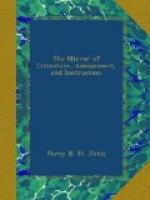“I now write to you from the Earl of Devonshire’s, where I have been this fortnight past, paying my devotions to the Genius of Nature. Nothing can be more romantic than this country except the region about Valois, and nothing can equal this place in beauty but the borders of the Lake.
“It was not, however, so much the desire of seeing natural curiosities that drew me hither: there is a certain moral curiosity under this roof which I have long wished to see, and my lord Devonshire had the goodness to indulge me by a very kind invitation: I need not tell you that I mean the great philosopher Mr. Hobbes, so distinguished for the singularity of his sentiments and disposition. I arrived a little before dinner, notwithstanding which the earl told me he believed I was too late to see Mr. Hobbes that day. ‘As he does not think like other men,’ said his lordship, ’it is his opinion that he should not live like other men; I suppose he dined about two hours ago, and he is now shut up for the rest of the day: your only time to see him is in the morning, but then he walks so fast up those hills that unless you are mounted on one of my ablest hunters you will not keep pace with him.’ It was not long before I obtained an audience extraordinary of this literary potentate, whom I found like Jupiter involved in clouds of his own raising. He was entrenched behind a battery of ten or twelve guns, charged with a stinking combustible called tobacco. Two or three of these he had fired off, and replaced them in the same order. A fourth he levelled so mathematically against me, that I was hardly able to maintain my post, though I assumed the character and dignity of ambassador from the republic of letters. ‘I am sorry for your republic,’ said Hobbes, ’for if they send you to me in that capacity, they either want me or are afraid of me: men have but two motives for their applications—interest and fear; but the latter is in my opinion most predominant.’ I told him that my commission extended no farther than to make him their compliments and to enquire after his health. ‘If that be all,’ said he, ’your republic does nothing more than




